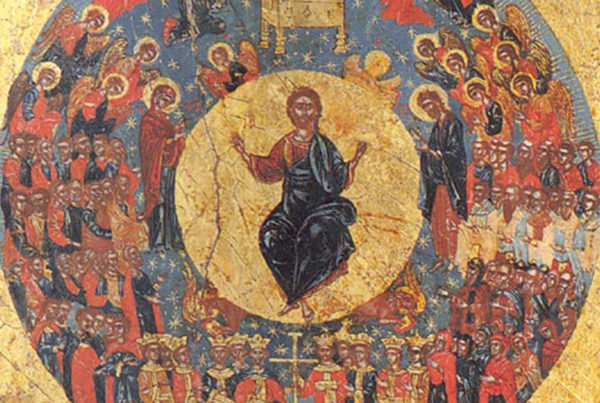I know for some people it is. In this when failures of human fatherhood abound, it is easy to move backwards into the biblical text with an impulse to sneer a bit at all such “masculine” talk of God, including that of God as “Father,” scouring the text to find different (better?) images for speaking of and to God – perhaps ones that position God in more maternal or purely spiritual terms.
We are right, I think, to desire to avoid projecting negative, false, misleading, or hurtful concepts onto God. The problem is that in pivoting from the central images the Scripture uses to speak of God, we will inevitably wind up introducing more dilemmas than we solve. If, for instance, for some people, the notion of “fatherhood” is troublesome because of bad experiences they’ve had with their own fathers, for others the notion of “motherhood” may be troublesome for the same reason. We don’t necessarily get ourselves off the hook there.
Or, if all such “parental” imagery (or, for that matter, “monarchial” imagery – anything that smacks of human hierarchy) is too much for us to bear, perhaps then we should pivot towards imagery that is more mystical and spiritual, referring to God as “the One” or “Ground of Being” or “Source.” But then… how does one have a meaningful, mutual relationship with a cosmic metaphysical source? It is at least challenging to know where to begin, and a new set of problems has just been introduced…
A better strategy, it seems to me, is to stick with the main ways the Scripture uses to speak of God, and let the Scripture itself inform just how we are to understand what is meant by those terms.
In an extraordinary passage of his Church Dogmatics, Karl Barth does just that. He writes of the way in which God reveals himself through the words of Scripture:
When He claims [these words]…He does in fact confirm himself [to us]…God describes and proclaims Himself [in them]…Our words are not our property but His…When we apply [these words] to God they are not alienated from their original object and therefore from their truth, but, on the contrary, are restored to it. (CD II/1, p. 229)
What Barth is saying is that in descending to our level by revealing himself to us in human speech, God does something remarkable with that speech – he both communicates himself through it and also saves the speech itself by filling it with new content; content that can only be discovered within the biblical story itself.
The Fatherhood of God, for Barth, is one of the central images that God does this with. The importance of this image in the biblical witness should it be overlooked. In the Gospels, Jesus refers to God as “Father” some 150 times. And when Jesus personally addresses God, he only calls him “Father” (with the exception of the cry of dereliction from the cross). The rest of the New Testament reflects this emphasis – God is the Father of Jesus the Son, and the church is the family of beloved sons and daughters of God. We cannot ignore this image without doing serious violence to the patterns of biblical speech – which are of course the fountainhead of our own patterns of speech.
But what does it mean for God to be “Father”? According to Barth, it is most definitely NOT a matter of taking human ideas of fatherhood and projecting them on to God. We are not being asked to enshrine fallenness in Deity.
No, for Barth, the Scripture itself dictates how we must understand the terms. What we mean by “Father” is nothing less than the total biblical story of God and his people with the Jesus of Nazareth as its focal point. God the Father blesses and delights in his Son, Jesus. And Jesus the Son always does what pleases the Father. Between them we see the Father-Child relationship working as it was always intended to work: a perfect confluence of willing, loving, delighting, and rejoicing. There is no attempt to wrest the “self” – either of them – one from the other. There is no conflict of wills, no hidden agendas – such as we so often see in fallen father-child relationships. Between THE Father and THE Son, there is no shadow of turning whatever.
Best of all, this is a relationship that we are invited to take our place in, according to the New Testament. The Spirit of the Son indwells us so that we can call out with the Son – better, so that the Son can call out within us, “Abba, Father.”
And so, while starting with a concept that (like all human concepts) is fraught with difficulty on account of sin, the Lord (as is his habit) lifts it up, cleanses it, and gives it back to us again – better than ever. “Call me Father,” he says, “and watch me save you through it.”
When we, therefore, call upon God as “Father,” we are not being forced to apply failures of human fatherhood onto God. We are being asked rather to learn to look upon God with the eyes of the Son of God himself, letting the Son by his Spirit in us reshape our own identities so that we find our place as sons and daughters of God in that delighted eternal movement of the Son to the Father and the Father to the Son in the grace of the Holy Spirit that is the Blessed Trinity – one God, now and forever. Amen.




